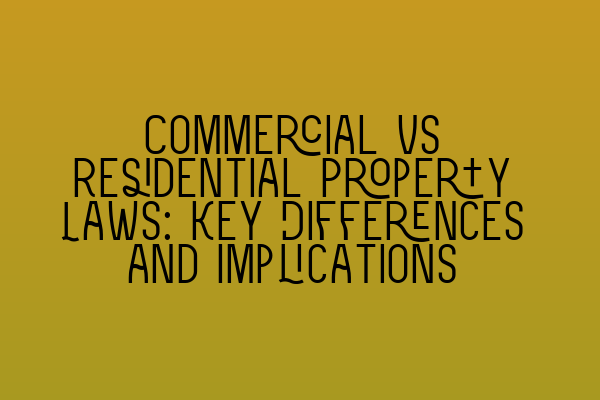Commercial vs Residential Property Laws: Key Differences and Implications
When it comes to property laws, the distinction between commercial and residential properties is significant. Understanding the differences and implications of these two types of properties is crucial for property law practitioners and anyone involved in the property industry. In this blog post, we will explore the key differences between commercial and residential property laws and their implications.
Commercial Property Laws:
Commercial property laws govern properties used for business purposes, such as offices, retail spaces, warehouses, and industrial units. These properties are primarily used for generating income through leases or rentals. Here are some key differences and implications of commercial property laws:
1. Lease Agreements: Commercial leases are typically longer in duration compared to residential leases. They often span several years and include specific clauses related to rent escalation, maintenance responsibilities, and options for renewal or termination. As a solicitor, understanding the complexities of commercial lease agreements is essential.
2. Planning and Zoning Regulations: Commercial properties are subject to rigorous planning and zoning regulations. These regulations govern how the property can be used, the type of businesses that can operate on the premises, and building codes. A sound knowledge of these regulations is critical for property law practitioners to ensure compliance and avoid legal disputes.
3. Dispute Resolution: Commercial property disputes often involve larger sums of money and complex legal issues. As a solicitor specializing in property law, expertise in dispute resolution mechanisms such as arbitration or mediation is essential. Familiarity with the relevant laws and case precedents will greatly assist in successfully resolving disputes on behalf of clients.
4. Property Finance: Commercial property financing involves more complex transactions compared to residential properties. Understanding the various financing options available, such as commercial mortgages, loans, or refinancing, is important for solicitors advising clients on purchasing or selling commercial properties.
Residential Property Laws:
Residential property laws govern properties that are primarily used for dwelling purposes, such as houses, apartments, or condominiums. These properties are owned or rented by individuals and families. Here are some key differences and implications of residential property laws:
1. Tenancy Laws: Residential tenancy laws provide protections to tenants and outline their rights and responsibilities. These laws cover aspects such as lease agreements, security deposits, eviction procedures, and maintenance obligations. Solicitors specializing in residential property law must be well-versed in these laws to advocate for the interests of their clients, whether landlords or tenants.
2. Property Transfers: Residential property transactions involve different legal processes compared to commercial properties. Solicitors handling residential property transactions must have expertise in drafting contracts, conducting property searches, and ensuring compliance with legal requirements. They also play a vital role in conducting due diligence to identify any potential issues that may affect the property’s value or legality.
3. Mortgage Laws: Residential property financing often involves securing a mortgage loan. Solicitors specializing in residential property law must have a thorough understanding of mortgage laws and be able to guide clients through the mortgage application process, negotiate terms with lenders, and ensure compliance with legal requirements.
4. Consumer Protection: Residential property laws offer additional protections to homebuyers and tenants due to their vulnerable position in the property market. Solicitors must be knowledgeable about consumer protection laws and regulations to safeguard their clients’ interests and ensure fair and transparent transactions.
Final Thoughts:
Understanding the key differences and implications of commercial and residential property laws is essential for legal practitioners specializing in property law. Whether you are dealing with commercial lease agreements, rezoning applications, residential property transfers, or tenant-landlord disputes, having expertise in the relevant area of law is critical for providing effective legal representation and advice to your clients.
At SQE Property Law & Land Law, we offer a range of preparation courses for aspiring solicitors, including SQE 1 and SQE 2 preparation courses. Check out our related articles for more information on SQE practice exam questions, mock exams, and exam dates. Stay ahead in the field of property law with our comprehensive training programs and excel in your legal career.
Related Articles:
– SQE 1 Practice Exam Questions
– SQE 1 Practice Mocks FLK1 FLK2
– SQE 2 Preparation Courses
– SQE 1 Preparation Courses
– SRA SQE Exam Dates
